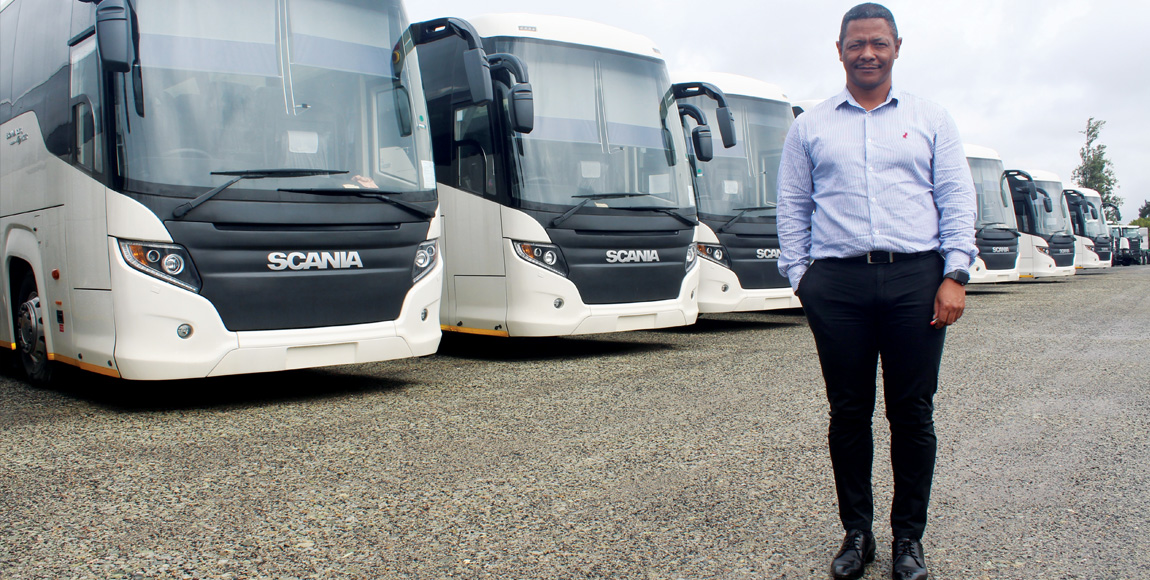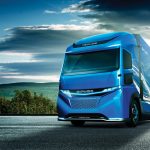For the people

As national bus sales manager of Scania South Africa, Esaia Taunyane knows that long-term relationships and customer satisfaction are keys to success in the bus and coach market
While both are built on relationships, the bus and coach industry is, arguably, a more personal one than the trucking and logistics industry. Indeed, the bus and coach industry is all about moving people – which means a direct impact is made on their lives.
“Bus and coach customers are warm people. You form a long-lasting relationship and become part of each other’s families. You get to know their joy and pain. You learn what it takes to keep them happy, which is beneficial to them, their passengers and us as a supplier,” Taunyane says.
Building these relationships led Taunyane to fall in love with the bus and coach industry – so much so that Scania South Africa has remained his home for the past 12 years. “I’ve never worked at any one company for that long,” he quips. “But this is a continuing personal journey, I have learnt and grown a lot.”
Taunyane initially joined Scania Finance from the banking industry, where he specialised in asset-based finance. “The difference compared to a traditional bank is that we are specialists in transport. We understand our customers, their operations, businesses and challenges. We are then able to support them properly, because we’re focused on them,” he says.
Taunyane’s journey with the company has also included bus sales – giving him a well-rounded appreciation of all sectors of the business. This is especially important considering Scania Bus’s centralised approach to customer accounts.
“Our six sales representatives (five operating throughout South Africa and one managing customers in export markets) take full ownership for their customers’ accounts. From new sales to after-sales service and solving issues, or addressing queries, we run with our customers from start to finish. Instead of them going from division to division, we coordinate everything on their behalf,” Taunyane explains.
He adds that the bus and coach market requires a different focus to the truck market. “The clientele are different; they need personalised attention. We walk the journey with our customers.”
This is especially important considering the current slow – but stable – sales conditions being experienced in the region. Various challenges marked 2018 as a tough year. The total market declined by about seven percent over 2017, from 1 088 to 1 014 units.
“In the local market, problems with subsidy payments put a dampener on procurement cycles for many operators, while short term contracts also impacted transporters’ capacity to acquire new units. In addition, the protracted drivers’ strike
(17 000 drivers over three weeks) placed many operators under enormous pressure on the cost and operating expenditure front,” explains Taunyane.
“Annual bus and coach sales have been consistent at between 1 000 and 1 200 units for more than a decade, and Scania anticipates that 2019 will replicate the pattern. From a retail perspective, 2019 is likely to be much the same as 2018. The election and continued insecurity surrounding foreign investment may impact the exchange rate, affecting vehicle pricing,” he adds.
The strategy for Scania Bus going forward, says Taunyane, is to continue to be a big player in the southern African bus and coach market.
“We need to constantly be our customers’ trusted parteners, while providing consistent and excellent service and ensuring we are there for them during both good and bad times,” he explains.
For Taunyane, this means placing an emphasis on communication with his team. “We talk daily in the mornings about the previous day’s challenges, and what needs to be done that day. I am only one phone call away; it’s all about communication and trust,” he emphasises.
This goes back to Taunyane’s favourite part about the bus and coach industry: the people. “It gives me great joy to see the impact that we make on communities. When we deliver a bus, it’s gratifying to see the difference made by providing them with safe and reliable transport,” he concludes.
Published by
Focus on Transport
focusmagsa




